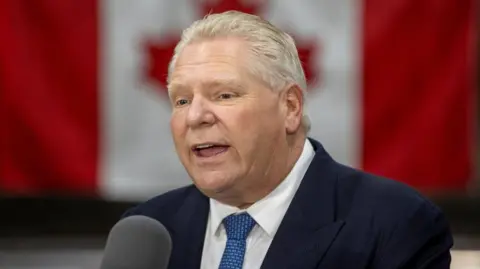Ontario ends contract with Musk's Starlink over US tariffs
 Reuters
ReutersThe leader of Ontario - Canada's most populous province - has said that American companies will be banned from provincial government contracts until the US ends the tariffs President Donald Trump imposed on Canada.
Ontario Premier Doug Ford also emphasised that his government would be "ripping up" its C$100m ($68m; £55.1) contract with Elon Musk's satellite internet company Starlink.
"Ontario won't do business with people hell-bent on destroying our economy," said Ford, who is running in the province snap election he called last week.
Trump and Canadian Prime Minister Justin Trudeau spoke on Monday about the 25% import tax on Canadian goods that the US president announced at the weekend.
Trump said in the Oval Office on Monday they had a "good talk" but that he raised a number of issues he saw as trade irritants.
"I'm sure you're shocked to hear that, but Canada is very tough," he said.
"They're very, very tough to do business with, and we can't let them take advantage of the US."
The president has given a number of reasons in recent months for threatening tariffs on Canada, from border security to trade deficits and the country's failure to meet Nato defence spending targets.
The pair are schedule to speak again this afternoon.
The president announced on Saturday that a 25% import tax on goods from Canada and Mexico would begin on Tuesday, along with 10% tariffs on goods from China.
Canadian energy faces a lower 10% tariff.
Trudeau immediately announced counter-tariff plans in response. He said that his government would place C$30bn in tariffs on American goods this week - with an additional C$125bn in 21 days, for a total of C$155bn ($107bn; £86bn) - if the US moves ahead with the levies.
Canada has "no choice but to hit back, and hit back hard", Ford said at a news conference on Monday.
"Canada didn't start this fight with the US, but you better believe we're ready to win it," the Ontario premier added.
Ford has targeted Starlink in that effort after his Ontario government partnered with the internet firm. The province launched a programme with Starlink last November that would offer high-speed satellite internet access to 15,000 eligible unserved and underserved homes and businesses.
Musk, the CEO of SpaceX - Starlink's parent company - is one of Trump's closest allies.
In a post on X, he responded with: "Oh well."
Ford said he believes the province has "a very good case" should Starlink attempt to challenge the move in court, but he is willing for the province to pay a penalty.
"It's the principle," he said.
Other Canadian provinces are taking a similar path.
Officials in Quebec, British Columbia and New Brunswick announced plans to target American booze, removing it from shelves in provincial liquor stores, and said they will revisit provincial contracts for US firms.
On Monday, Mexican President Claudia Sheinbaum and Trump announced that they had agreed on a one-month delay on tariffs on imports from her country after she promised to send additional Mexican National Guard troops to the border.
A Canadian official told the New York Times that Ottawa is not optimistic it will get a similar reprieve.
The president said tariffs are needed to "protect" Americans from the "major threat of illegal aliens and deadly drugs", including fentanyl.
His administration alleges that Mexican gangs have fentanyl labs in Canada. Trudeau has said less than 1% of fentanyl entering the US comes from his country.
In December, Canada said it would devote C$1.3bn ($900m; £700m) to a new border plan that included strengthened surveillance.
This month, Canadian premiers will travel to Washington DC to lobby against the tariffs and will attend a meeting of US state governors.
All three major stock exchanges in the US tumbled after they opened on Monday. It was the first official trading since Trump issued his orders raising tariffs on imports from Canada, Mexico and China.
